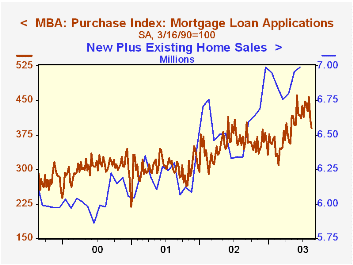 Global| Aug 20 2003
Global| Aug 20 2003Mortgage Applications Down
by:Tom Moeller
|in:Economy in Brief
Summary
The index of mortgage applications compiled by the Mortgage Bankers Association fell another 10.7% last week following the 16.1% drop the week prior. Since the peak in late May mortgage applications are down by almost two-thirds. [...]

The index of mortgage applications compiled by the Mortgage Bankers Association fell another 10.7% last week following the 16.1% drop the week prior. Since the peak in late May mortgage applications are down by almost two-thirds.
Purchase applications have weakened. Last week mortgage applications for home purchase fell 4.9% and that added to a 10.3% decline the week prior. Since the peak in late May purchase applications have fallen 15.4%.
During the last ten years there has been a 54% correlation between the y/y change in purchase applications and the change in new plus existing home sales.
Applications to refinance continued to plummet. They fell 14.9% last week and by nearly one third in just the last two weeks. Refinancings were down 72.4% from the peak in late May.
Interest rates on a conventional 30-Year mortgage moved back up, rising 24 basis points w/w to 6.52%. That was versus a low for 30-Year financing of 5.31% in the second week of June. The effective rate on a 15-year mortgage rose to 5.91%, up 29 basis points w/w.
The Mortgage Bankers Association surveys between 20 to 35 of the top lenders in the U.S. housing industry to derive its refinance, purchase and market indexes. The weekly survey accounts for more than 40% of all applications processed each week by mortgage lenders.
For the August Senior Loan Officer Survey on Bank Lending Practices from the Federal Reserve Board, click here.
Visit the Mortgage Bankers Association site at www.mbaa.org.
| MBA Mortgage Applications (3/16/90=100) | 8/15/03 | 8/08/03 | 2002 | 2001 | 2000 |
|---|---|---|---|---|---|
| Total Market Index | 736.7 | 824.6 | 799.7 | 625.6 | 322.7 |
| Purchase | 389.5 | 409.6 | 354.7 | 304.9 | 302.7 |
| Refinancing | 2,756.8 | 3,238.4 | 3,388.0 | 2,491.0 | 438.8 |
by Tom Moeller August 20, 2003

The U.S. Government budget deficit deepened last month to $54.2B. That was versus of deficit of $29.2B in July '02. The deficit was slightly deeper than most analysts had expected.
The Federal government's deficit totaled $320.4B through the first ten months of this fiscal year. That is versus a deficit of $145.5B through the first ten months of FY2002.
Net receipts for the first ten months of FY03 fell 3.9% versus last year. Individual tax payments fell 6.9% and corporate income taxes were down 14.8%. Social insurance contributions rose 1.7% and excise taxes also rose just slightly.
Federal net expenditures rose 7.1% versus last fiscal year's first ten months. Defense spending surged 15.9% to 18.4% of the Federal budget. Spending on health programs was strong as well, up 11.3%, and spending on education surged 17.0% to 3.8% of the budget. Spending on income security rose 8.1% to 16.0% of the Federal budget and Medicare outlays rose 8.3% to 11.5% of the budget. Social Security outlays rose 4.1% to 21.9% of the budget. Interest expense fell 10.0% y/y.
For a report titled "Understanding State Budget Troubles" from the Federal Reserve Bank of San Francisco click here.
| US Government Finance | July | June | June '02 | FY2002 | FY2001 | FY2000 |
|---|---|---|---|---|---|---|
| Budget Balance | $-54.2B | $21.2B | $-29.2B | $-157.8B | $127.3B | $236.4B |
| Revenues | $123.6B | $193.1B | -8.1% | -6.9% | -1.7% | 10.8% |
| Outlays | $177.8B | $171.8B | 8.7% | 7.9% | 4.2% | 5.1% |
Tom Moeller
AuthorMore in Author Profile »Prior to joining Haver Analytics in 2000, Mr. Moeller worked as the Economist at Chancellor Capital Management from 1985 to 1999. There, he developed comprehensive economic forecasts and interpreted economic data for equity and fixed income portfolio managers. Also at Chancellor, Mr. Moeller worked as an equity analyst and was responsible for researching and rating companies in the economically sensitive automobile and housing industries for investment in Chancellor’s equity portfolio. Prior to joining Chancellor, Mr. Moeller was an Economist at Citibank from 1979 to 1984. He also analyzed pricing behavior in the metals industry for the Council on Wage and Price Stability in Washington, D.C. In 1999, Mr. Moeller received the award for most accurate forecast from the Forecasters' Club of New York. From 1990 to 1992 he was President of the New York Association for Business Economists. Mr. Moeller earned an M.B.A. in Finance from Fordham University, where he graduated in 1987. He holds a Bachelor of Arts in Economics from George Washington University.
More Economy in Brief
 Global| Feb 05 2026
Global| Feb 05 2026Charts of the Week: Balanced Policy, Resilient Data and AI Narratives
by:Andrew Cates






